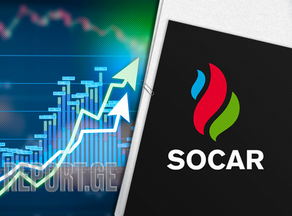
The State Oil Company of Azerbaijan (SOCAR) is increasing its role in world markets. The company signs new contracts and expands the geography of its activities (oil extraction, supply, transit).
Report.az writes that at the end of 2020, the subsidiary of the State Oil Company of Azerbaijan - SOCAR Trading - won the tender for the purchase of Turkmen oil produced by Eni Turkmenistan. With this, SOCAR Trading regained its share of Turkmen oil in its portfolio. SOCAR Trading beat oil giants such as ENOC, Vitol, Rosneft, Lukoil, and Trafigura in the tender.
Eni Turkmenistan plans to transit 30-40 thousand tons of Okarem oil per month by 2021, which will be carried out by the Azerbaijani side.
According to Azerbaijani experts, this deal is of great importance for SOCAR Trading and Azerbaijan. The fact is that in 2019, the purchase of Turkmen oil by an Azerbaijani company was stopped. Before that, Turkmen oil was transited through the Baku-Tbilisi-Ceyhan (BTC) oil pipeline for nine years.
According to Azerbaijani media, Turkmen oil exports through the Baku-Tbilisi-Ceyhan (BTC) oil pipeline began in 2010. In 2010-2019, Turkmenistan supplied 3-4 million tons of oil and oil products to world markets through BTC.
Oil expert Ilham Shaban explains that in 2018, the Azerbaijani logistics company lost a tender announced by the Turkmen side to a Russian company. As a result, in 2019, Turkmen oil began to enter the world market, bypassing the Baku terminals. Its transit took place via the Makhachkala oil pipeline to Novorossiysk. It turned out that the new company did not have enough tankers in reserve to transport the oil. Due to this, there were delays, which significantly reduced the supply of Turkmen oil to world markets. This had a negative impact on the income of foreign oil companies in Turkmenistan.
The fact that SOCAR Trading surpassed the world's oil traders and managed to win the last tender for the purchase and transportation of Turkmen oil, according to Shaban, indicates that the Azerbaijani company was able to regain its position. After winning the tender, Azerbaijan and Turkmenistan have agreed to transit about 1 million tonnes of crude oil produced by Petronas in the Kiyanly in Turkmenistan annually.
According to Ilham Shaban, the advantage of the BTC pipeline is that with this pipeline, Azerbaijan can supply oil to any buyer (Europe, Asia, or the Middle East) without any problems. Shaban noted that today not only Turkmen but also Kazakh and Russian oil extracted from the Caspian fields are transported via Baku-Tbilisi-Ceyhan.
According to the expert, the company "Lukoil" sends part of its oil, which is produced in the Caspian Sea, to the world market via Baku-Tbilisi-Ceyhan. Over the past ten years, Lukoil has shipped more than 10 million tons of oil through this pipeline.
"In other words, the advantages of the Azerbaijani route are obvious. All that remains is to offer favorable conditions in order to attract even more Caspian oil to this pipeline," Shaban concluded.
The annual volume of SOCAR trade contracts in the Caspian region is more than 4 million tons. This is BTC's rate of transit of various types of oil from Turkmenistan, Russia, and Kazakhstan.
Shaban reviews in detail SOCAR's business activities in Belarus and concludes that SOCAR will establish itself in the world market as a reliable and profitable partner. According to him, SOCAR manages to diversify markets in both business and sectoral terms, which, in his opinion, is good because diversification is the main condition for the long-term success of any large business.































